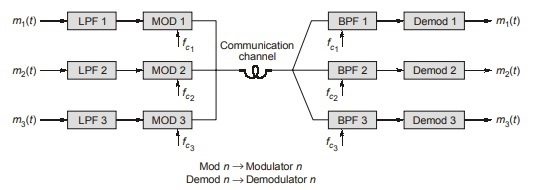Multiplexing
Multiplexing is the sending of a number of separate signals together over the same cable or bearer, simultaneously without interference. Multiplexing is of two types:
- Time Division Multiplexing
- Frequency Division Multiplexing
Frequency Division Multiplexing
- The operation of FDM is based on sharing the available bandwidth of a communication channel among the signals to be transmitted.
- In FDM, a number of signal share the channel bandwidth and each signal is modulated by a different carrier frequency. The modulator outputs will contain sidebands of corresponding signals. The modulator outputs are added together in a adder.
- In receiver sides, the composite signals is applied to group of bandpass filters (BPF). Each filter will pass only its channel and reject all other channels. The channel demodulator then removes carrier and recovers original signal back.

- LPF is used to bandlimit the message signal.
- Suppose there are two message signals.

- If no modulator is used and they are transmitted through channel, then interference occurs.
- If they are modulated by same frequency e.g. 15 kHz.

Then, also they occupy same frequency band and interference occurs.
- If they are modulated with different carrier frequencies fc1 and fc2

Now, to avoid any interference
(fc2 – 10 K) – (fc1 + 10 K) > 0
fc2 – fc1 > 20 K
Advantages of FDM
- Large number of signals can be transmitted simultaneously.
- No synchronization is needed between transmitter and receiver.
- Demodulation is easy.
Disadvantages of FDM
- Communication channel must have large bandwidth.
- Large number of modulators and filters are required.
- Crosstalk occurs between consecutive channels.
- Intermodulation distortion may occur.
Application of FDM
- Telephone system.
- AM, FM, radio broadcasting.
- TV broadcasting
- First generation of cellular phones used FDM.
<< Previous | Next >>
Must Read: What is Communication?
WhatsApp Group
Join Now
Telegram Group
Join Now

